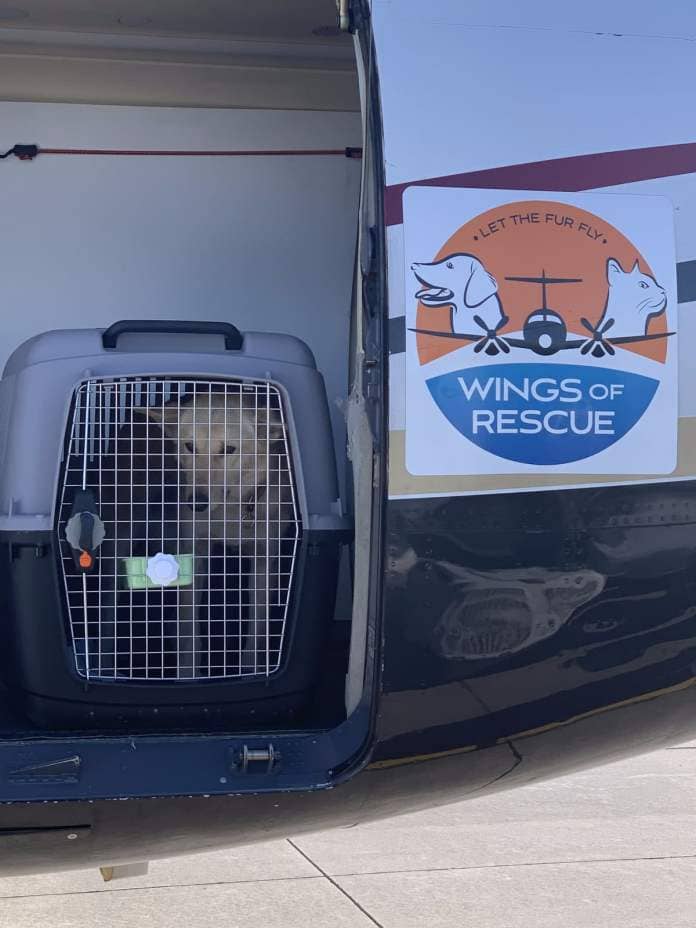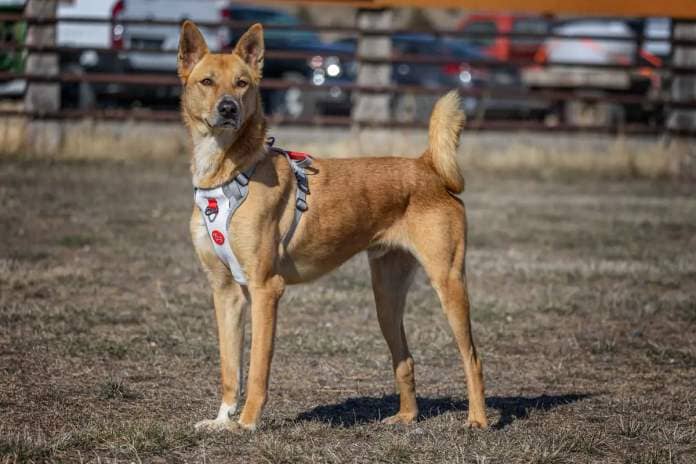Earlier this month, SPCA International evacuated 70 shelter dogs from the Israeli-occupied West Bank to destinations in Wyoming, California and Washington. The unprecedented airlift was accomplished with the help of Livingston-based Maggie McGuane.
It was 10 years ago that Maad Abu-Ghazalah began thinking about what he could give back to the people of the West Bank. Abu-Ghazalah, who grew up in Palestine but later moved to the United States and made money in Silicon Valley, reflected on what the people in his homeland needed. He didn’t think it was food or shelter.
Instead, he thought, after decades of occupation by the Israeli government Palestinians needed something else: a dose of humanitarianism. Throughout his lifetime, he said, Palestinians have been living in “an unnatural state.”
“[Israeli Defense Forces] search you, they humiliate you, you take it out on your kids, kids take it out on animals,” Abu-Ghazalah said. “It’s this whole cycle of unpleasantness.”
“The Israelis tried to teach us [that] might makes right,” he told Montana Free Press from his home in North Carolina last week. “What I thought [Palestinians] needed most was an alternative way to look at the world.”

The thing that struck him most about his homeland was the feral dogs. They were everywhere, and widely mistreated. The main form of population control was mass killings, including poisonings.
So in 2014, Abu-Ghazalah founded Daily Hugz, a sanctuary in Asira, near Nablus, in the West Bank. Daily Hugz rescued the most vulnerable animals, those that had been hit by cars or abused by humans, the dogs at death’s door. He hired employees to run the shelter, but even as he continued living in the United States Abu-Ghazalah maintained an active role in the shelter, frequently traveling back to Palestine. He opened the shelter to kids, hosting school groups and showing them how they could help care for creatures that were worse off, rather than dominating them.
“I wanted kids to see a situation where you take care of people if you’re more powerful than them. It’s your responsibility,” he said.
But after Oct. 7, when the current Israel-Hamas war started, conditions in the West Bank got worse. Though the fighting was in Gaza, on the other side of Israel, the Israeli Defense Forces restricted travel in the West Bank, limiting personal movement and the transfer of goods.
That made it much harder to take care of the dogs. Medicine and pet food prices were rising. A 40-mile highway journey was suddenly taking more than four hours. And for Abu-Ghazalah, traveling from the United States to the West Bank was becoming increasingly difficult. Soon, he realized, he would have no choice but to close Daily Hugz.
“I wanted kids to see a situation where you take care of people if you’re more powerful than them. It’s your responsibility.”
Daily Hugz founder Maad Abu-Ghazalah
“It was not in the interest of the dogs to maintain the sanctuary anymore,” he said.
He knew he couldn’t abandon the dogs that had helped so many people. So he called SPCA International, a New York-based nonprofit that organizes global animal rescues. SPCA International answered the call, and coordinated a multi-month international effort and earlier this month performed the largest international evacuation of dogs in U.S. history.
Moving 70 dogs 7,500 miles from a sanctuary in the West Bank to rescue groups in seven U.S. states is a feat of complex logistics. The dogs were evacuated from Daily Hugz by truck, carried by hand across a checkpoint from the West Bank into Israel, and finally flown halfway around the world on planes.
SPCA International helped coordinate the trip from Tel Aviv to New York City, but once the dogs got to the states, SPCA sought help from two air rescue nonprofits: Wings of Rescue and Race for Life Rescue.
After the pets landed in the U.S. on March 15. McGuane, disaster response director for Wings of Rescue, helped coordinate flights for the dogs from John F. Kennedy Airport in New York City to their final destinations in three Western states: Wyoming, California and Washington.
McGuane, who has helped coordinate rescue missions from Miami to locales as distant as Canada’s Northwest Territories, said she was impressed by the resilience of the dogs, which had spent six or seven days on planes. For many, it was their first long trip in a crate.
McGuane shared a video of a dog named Lucas on the tarmac at the airport in Farmingdale, New York. The three-legged dog basks in the sun under the wing of an airplane until rescuers call his nameand his tail starts wagging. Then he jumps up and starts hopping excitedly around the runway.
“I was like, ‘How the hell are you so OK with this?’ My dog would be done after one of those flights,” McGuane said. “They spent six or seven days on planes, making their way across the world. They were healthy. They were chill. It was sort of heartbreaking, many of them were missing a limb. Some of them were certainly fearful, but the bulk of them were just rolling with it.”
Amanda Gates, director of development and communications for Race for Life Rescue, which transported some of the dogs to shelters in the eastern and midwestern United States, said that without the efforts of rescuers, the dogs “would have been left essentially to die.”
“It was something we couldn’t turn our backs on. We helped because we can,” she said.
Gates said she understands criticism, levelled on TikTok and elsewhere, that the same help could better benefit people suffering in Gaza, but noted there are other organizations designed to help humans.
“Saving a life is saving a life,” she said.
A journey of a thousand miles may begin with a single step. But for this a journey of 7,500 miles, the first 50 miles were most critical.
Abu-Ghazalah said the thorniest logistics involved navigating a checkpoint between the West Bank and Israel. For months, the Israeli government kept changing its mind about which of 12 available checkpoints he could bring the dogs through.

At checkpoints in and out of the West Bank,your license plate color determines your ability to cross the border, Abu-Ghazalah said. A green license plate means you’re a Palestinian from the West Bank, and you can’t get through the checkpoint. A yellow license plate means you’re a Jew living in the West Bank or an Israeli citizen. With a yellow license plate, you can generally drive right through.
One of the first things Abu-Ghazalah had to do was secure a truck with a yellow license plate.
Then, after a month of negotiation, the Israeli government agreed that he could take the dogs in a truck through a checkpoint at the Palestinian city of Tulkarm at 6 a.m. Because of the early departure, he spent the day prior prepping the truck. The next morning, he and the shelter’s veterinarian left Asira early with the dogs. As they approached the town, they encountered a hurdle: the road had been destroyed by the Israeli army. They called locals to figure out an alternative route and eventually drove the trucks through nearby olive orchards toreach the checkpoint.
Once they arrived at the border, the Israeli Defense Forces made Abu-Ghazalah bring in a new truck from Israel to ensure they weren’t trying to smuggle weapons, and he and the veterinarian carried the dogs one crate at a time from one truck to the other.
After passing through the checkpoint, they continued with the dogs to the airport in Tel Aviv, where 70 new crates he had purchased at the insistence of the Israeli government were waiting. There, Israeli officials made Abu-Ghazalah and the veterinarian transfer the dogs into the new crates.
“These are 70 feral dogs,” Abu-Ghazalah said.
He said it took about an hour to transfer the first 64 dogs, which were relatively docile, but that six other dogs were more like “Tasmanian devils” and took two hours to switch.
On March 13, the SPCA-chartered plane flew from Tel Aviv to Brussels, Belgium, where the dogs were put on another plane to John F. Kennedy Airport in New York City.
All of the dogs are now at their final destinations in locations across the United States.
John Ramer, executive director of Kindness Ranch in Hartville, Wyoming, received 10 of the dogs. Ramer said he happily took in animals that needed the most care, the traumatized or the especially shy.
They’ve started a 10-day observation period to make sure they’re free of any medical conditions. Then he’ll put them up for adoption.
Kindness Ranch normally only accepts animals from laboratory research, but Ramer made an exception for the dogs of Daily Hugz.

“We just wanted to help the dogs,” he said.
Abu-Ghazalah said the kids back in Palestine don’t understand why the dogs had to go, but he’s grateful that people in the U.S. were willing to accept the animals. He said the dogs have always acted grateful: to have a meal, to have a place to stay, to be safe.
“Potty training is the only thing people will have to deal with,” he said. “They love belly rubs. [I don’t know] why they’re so trusting and loving of humans. But I noticed the second they got on the sanctuary, they were all so grateful to be there.”
Abu-Ghazalah said he also took four of the dogs into his own home: two sisters, Tayba and Fayrooz; a three-legged dog named Jenan; and Kareem.
He has a house with a yard in North Carolina and said the dogs will have a nice life. He said it was hard to choose just four.
“For sure, I wanted more,” he said. “But I had to be reasonable about it.”
LATEST STORIES
The Viz: Growth rates tick down for large Montana counties
Montana’s largest counties continue to grow in population, but the rate at which they’re adding new people has slowed in recent years, according to data from the U.S. Census Bureau, which released official county-level population counts for 2023 on March 14.
Flathead Lake level dispute boils in letters to federal hydroelectric regulators
The Federal Energy Regulatory Commission has been asked to referee a dispute over the management of the Séliš Ksanka QÍispé Dam (formerly Kerr Dam). In a March 1 letter to FERC, Lake County Commissioners argued that low lake levels could endanger Flathead Lake residents in the event of a wildfire due to the loss of a secondary escape route.
Safety net consolidation means closures for longtime nonprofits
Last fall, the state Department of Public Health and Human Services announced it would be seeking a single, statewide contractor to provide employment assistance and training to Montanans receiving food and cash aid from SNAP and TANF, two of the state’s most prominent public safety net programs. In January, the state tapped Maximus, a global government contractor, to roll out a hybrid in-person and virtual service model starting this spring. The impact, at least in the short term, include the closure of some of the brick-and-mortar community nonprofits that have contracted with the state for decades.


